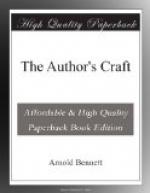Apart from the fact that no artist who pretends also to be a man can in this world hope for a free mind, and that if he seeks it by neglecting his debtors he will be deprived of it by his creditors—apart from that, the artist’s demand for a free mind is reasonable. Moreover, it is always a distressing sight to see a man trying to do what nature has not fitted him to do, and so doing it ill. Such artists, however—and they form possibly the majority—can always employ an expert to do their business for them, to cope on their behalf with the necessary middleman. Not that I deem the publisher or the theatrical manager to be by nature less upright than any other class of merchant. But the publisher and the theatrical manager have been subjected for centuries to a special and grave temptation. The ordinary merchant deals with other merchants—his equals in business skill. The publisher and the theatrical manager deal with what amounts to a race of children, of whom even arch-angels could not refrain from taking advantage.
When the democratisation of literature seriously set in, it inevitably grew plain that the publisher and the theatrical manager had very humanly been giving way to the temptation with which heaven in her infinite wisdom had pleased to afflict them,—and the Society of Authors came into being. A natural consequence of the general awakening was the self-invention of the literary agent. The Society of Authors, against immense obstacles, has performed wonders in the economic education of the creative artist, and therefore in the improvement of letters. The literary agent, against obstacles still more immense, has carried out the details of the revolution. The outcry—partly sentimental, partly snobbish, but mainly interested—was at first tremendous against these meddlers who would destroy the charming personal relations that used to exist between, for example, the author and the publisher. (The less said about those charming personal relations the better. Documents exist.) But the main battle is now over, and everyone concerned is beautifully aware who holds the field. Though much remains to be done, much has been done; and today the creative artist who, conscious of inability to transact his own affairs efficiently, does not obtain efficient advice and help therein, stands in his own light both as an artist and as a man, and is a reactionary force. He owes the practice of elementary common sense to himself, to his work, and to his profession at large.
IV
The same dilettante spirit which refuses to see the connection between art and money has also a tendency to repudiate the world of men at large, as being unfit for the habitation of artists. This is a still more serious error of attitude—especially in a storyteller. No artist is likely to be entirely admirable who is not a man before he is an artist. The notion that art is first and the rest of the universe nowhere is bound to lead to preciosity and futility in art. The artist who is too sensitive for contacts with the non-artistic world is thereby too sensitive for his vocation, and fit only to fall into gentle ecstasies over the work of artists less sensitive than himself.




